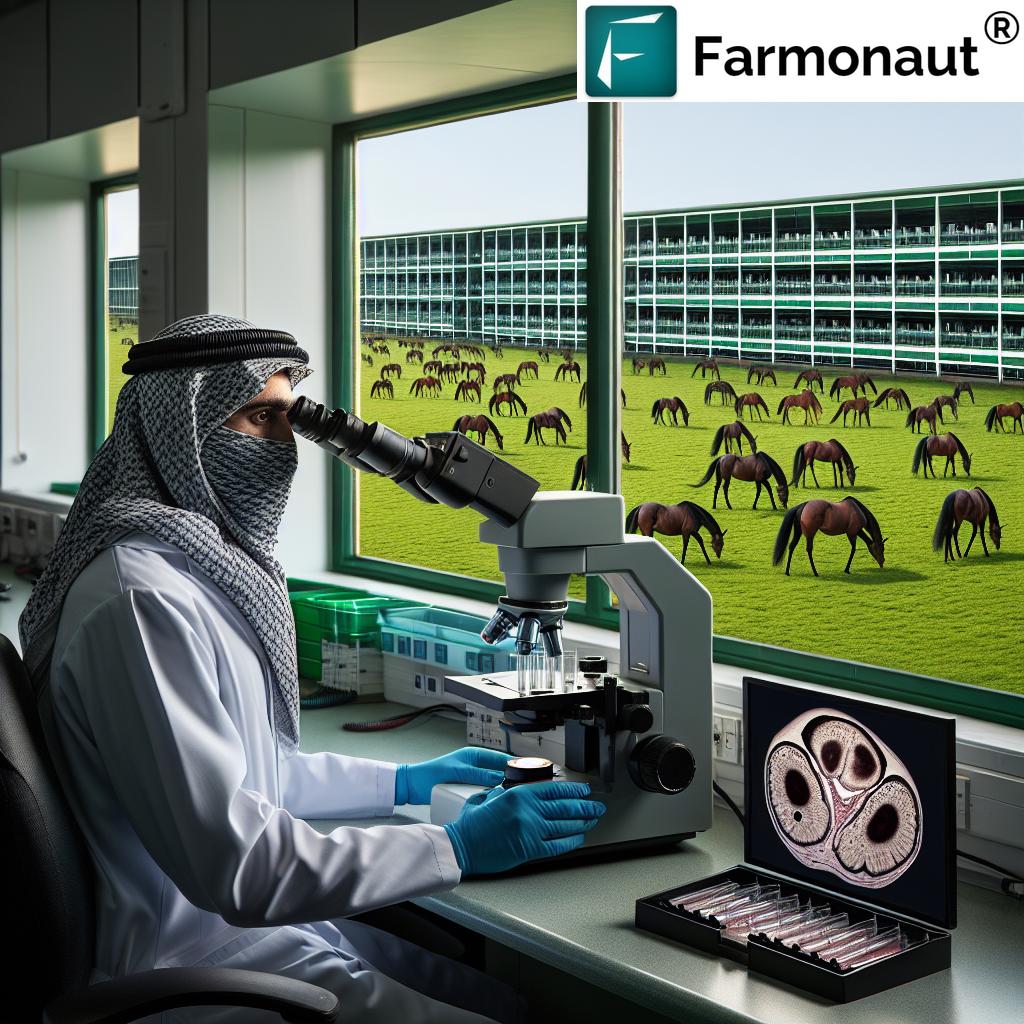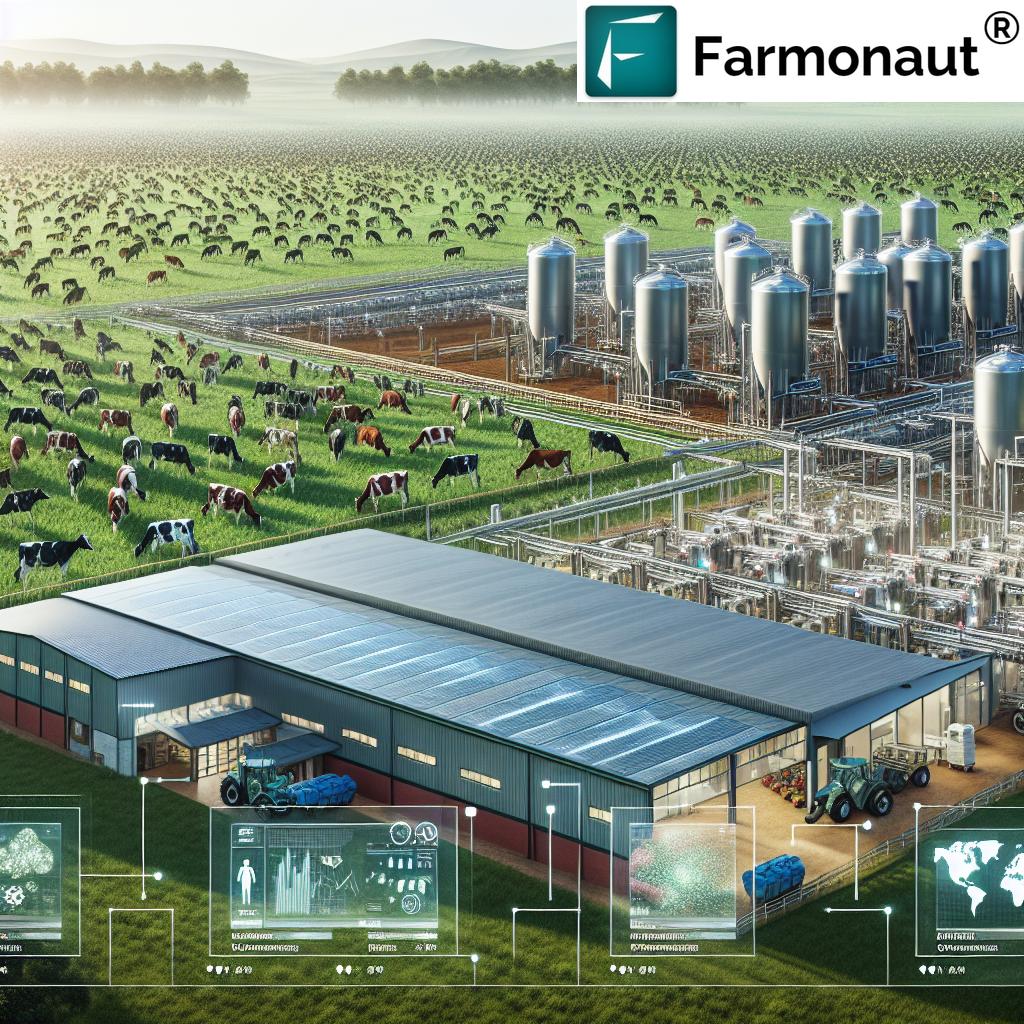Breakthrough in Australian Equine Research: Post-Mortem Analysis Tackles Thoroughbred Pregnancy Loss Challenges
“The Australian equine research project spans 29 months, from February 2022 to June 2024, focusing on improving thoroughbred mare fertility rates.”
In the heart of Australia’s prestigious thoroughbred industry, a groundbreaking research project is underway, promising to revolutionize our understanding of equine pregnancy loss and pave the way for innovative solutions in horse breeding. As we delve into this exciting development, we at Farmonaut recognize the immense potential for agricultural technology to support and enhance traditional farming practices, including those in the equine sector.
The Scope and Significance of the Study
The equine pregnancy loss research project, spanning from February 2022 to June 2024, represents a significant investment in the future of Australia’s thoroughbred industry. This comprehensive study aims to tackle one of the most pressing challenges faced by horse breeders: the loss of foetuses during pregnancy. By employing cutting-edge post-mortem analysis techniques, researchers are cultivating knowledge that could dramatically improve mare fertility rates and sustainable horse breeding practices.

The agricultural community faces growing challenges, and this research represents a beacon of hope for the equine industry. By addressing the complex issues surrounding pregnancy loss in thoroughbreds, we’re not only investing in the health and welfare of these magnificent animals but also supporting the economic vitality of rural communities that depend on the horse breeding industry.
Innovative Approaches in Equine Research
The core of this breakthrough lies in the meticulous post-mortem analysis of foetal losses. Researchers are examining pathology, histology, and epidemiology to gain a comprehensive understanding of the factors contributing to pregnancy loss in thoroughbred mares. This multifaceted approach allows for a deeper insight into the complex interplay of genetic, environmental, and management factors that influence equine reproduction.
As pioneers in agricultural technology, we at Farmonaut understand the importance of data-driven insights in modern farming practices. While our focus is on crop management and monitoring, the principles of leveraging technology for agricultural advancement align closely with the goals of this equine research project.
Collaboration and Geographical Scope
“The study covers a vast geographical area, encompassing both Southern Queensland and Northern Victoria, collaborating with multiple stud farms.”
The expansive reach of this research project is one of its most impressive aspects. By spanning Southern Queensland and Northern Victoria, the study encompasses a diverse range of environmental conditions and breeding practices. This geographical diversity enhances the robustness of the data collected and ensures that the findings will be applicable across various Australian regions.
Collaboration is at the heart of this project, with researchers working closely with stud farms and veterinary professionals. This partnership between academia and industry is crucial for translating research findings into practical applications that can benefit horse breeders directly.
Rapid Data Collection and Analysis
One of the most innovative aspects of this research is the emphasis on rapid collection and analysis of data. This approach ensures that breeders receive timely feedback, allowing them to make informed decisions quickly. In the fast-paced world of thoroughbred breeding, where every decision can have significant financial implications, this speed of information delivery is invaluable.
At Farmonaut, we understand the importance of real-time data in agricultural decision-making. Our satellite-based crop health monitoring system provides farmers with up-to-date information on their fields, allowing for timely interventions. Similarly, this equine research project’s rapid data processing exemplifies how technology can enhance traditional agricultural practices.
Impact on Rural Veterinary Services
This research project is not only advancing our understanding of equine reproduction but also driving progress in rural veterinary services. By involving local veterinary professionals in the study, the project is fostering knowledge transfer and skill development in remote areas. This upliftment of rural veterinary capabilities is crucial for the long-term sustainability of the thoroughbred industry in Australia.
The emphasis on rural development aligns with our mission at Farmonaut to make advanced agricultural technologies accessible to farmers in all regions. Just as we strive to bring precision agriculture to remote areas through our satellite-based solutions, this equine research project is bringing cutting-edge veterinary practices to rural Australia.
Addressing Industry Challenges
The thoroughbred breeding industry faces numerous challenges, from environmental pressures to economic uncertainties. This research project addresses one of the most significant issues: pregnancy loss. By tackling this problem head-on, the study has the potential to:
- Increase the success rate of thoroughbred pregnancies
- Reduce economic losses associated with failed pregnancies
- Improve the overall health and welfare of broodmares
- Enhance Australia’s reputation as a leader in thoroughbred breeding
These potential outcomes underscore the importance of continued investment in agricultural research and innovation. At Farmonaut, we’re committed to supporting such advancements through our agritech solutions, which can be adapted to various agricultural sectors, including livestock management.
Explore Farmonaut’s API for advanced agricultural data analysis
The Role of Technology in Modern Agriculture
While this research focuses on equine reproduction, it highlights the broader trend of technology integration in agriculture. From satellite imagery to AI-driven analytics, modern farming practices are increasingly relying on advanced technologies to optimize production and address challenges.
At Farmonaut, we’re at the forefront of this technological revolution in agriculture. Our satellite-based crop monitoring system and AI advisory tools demonstrate how technology can transform farming practices. While our primary focus is on crop management, the principles of data-driven decision-making apply equally to livestock industries like thoroughbred breeding.

Sustainable Practices in Horse Breeding
Sustainability is a key focus of modern agriculture, and the thoroughbred breeding industry is no exception. This research project contributes to sustainability in several ways:
- Improving resource efficiency by reducing pregnancy losses
- Enhancing animal welfare through better understanding of reproductive health
- Promoting long-term economic viability of stud farms
- Encouraging knowledge-sharing and best practices among breeders
These sustainability efforts mirror our commitment at Farmonaut to promote environmentally friendly farming practices through precision agriculture and resource optimization.
Empowering Women in Agriculture
It’s worth noting that this research project also contributes to the growing role of women in agricultural research and veterinary sciences. The equine industry has long been a field where women have made significant contributions, and this trend continues with this groundbreaking study. By fostering diversity in agricultural research, we ensure a broader range of perspectives and ideas, leading to more comprehensive and innovative solutions.
At Farmonaut, we recognize the importance of inclusivity in agriculture and technology. Our tools are designed to be user-friendly and accessible to all, regardless of gender or technical background, empowering a diverse range of users to leverage technology in their agricultural practices.
Access Farmonaut’s API Developer Docs for integration into your agricultural systems
The Future of Equine Research and Agriculture
As we look to the future, the implications of this research extend far beyond the immediate realm of thoroughbred breeding. The methodologies and technologies developed through this study have the potential to:
- Inform breeding practices for other horse breeds and livestock species
- Contribute to advancements in veterinary medicine and animal health
- Drive innovation in agricultural technology and data analysis
- Strengthen Australia’s position as a global leader in agricultural research
At Farmonaut, we’re excited about the future of agriculture and the role that technology will play in addressing global challenges. While our focus is on crop management, we see tremendous potential for cross-pollination of ideas between various agricultural sectors, including equine breeding.
Comparative Analysis of Thoroughbred Pregnancy Loss Factors
| Factor Category | Specific Factor | Estimated Prevalence (%) | Impact Level | Potential Mitigation Strategies |
|---|---|---|---|---|
| Genetic | Chromosomal Abnormalities | 15-20% | High | Genetic screening, selective breeding |
| Environmental | Stress | 10-15% | Medium | Improved stable management, stress reduction techniques |
| Management | Nutritional Deficiencies | 5-10% | Medium | Balanced diet, nutritional supplements |
| Infectious | Viral/Bacterial Infections | 10-20% | High | Vaccination, improved hygiene practices |
| Physiological | Hormonal Imbalances | 5-10% | Medium | Hormonal therapy, regular health checks |
This table provides a comprehensive overview of the factors contributing to pregnancy loss in thoroughbred horses, as identified through the ongoing research. It highlights the multifaceted nature of the challenge and the various approaches being explored to mitigate these risks.
Integrating Research Findings with Agricultural Technology
As the equine pregnancy loss research progresses, there’s immense potential for integrating its findings with existing agricultural technologies. At Farmonaut, we see opportunities for adapting our satellite-based monitoring and AI advisory systems to support equine health management. While our current focus is on crop health, the principles of data collection, analysis, and actionable insights can be applied to livestock management as well.
Potential applications could include:
- Monitoring pasture health for grazing mares
- Tracking environmental conditions that may impact equine health
- Developing AI models to predict pregnancy risks based on multiple factors
- Creating blockchain-based systems for tracking breeding lineages and health records
These ideas represent the exciting possibilities that emerge when cutting-edge research meets innovative agricultural technology.
The Role of Government and Industry Support
The success of this research project underscores the importance of continued government and industry support for agricultural innovation. Investments in research and development not only benefit specific sectors like thoroughbred breeding but also contribute to the overall advancement of Australia’s agricultural capabilities.
At Farmonaut, we advocate for policies that promote agricultural technology adoption and support research initiatives. By fostering an environment of innovation and collaboration, we can ensure that Australian agriculture remains at the forefront of global advancements.
Knowledge Sharing and Industry Events
As the research progresses, knowledge sharing becomes crucial. Industry events, conferences, and workshops provide valuable platforms for disseminating findings and fostering collaboration. These gatherings allow researchers, breeders, and technology providers to exchange ideas and explore new solutions.
While Farmonaut’s primary focus is on crop management, we recognize the value of cross-industry learning. The insights gained from this equine research could inspire new approaches in other agricultural sectors, and vice versa.
Conclusion: A New Era for Thoroughbred Breeding
The breakthrough in Australian equine research, focusing on post-mortem analysis to tackle thoroughbred pregnancy loss challenges, marks the beginning of a new era in horse breeding. By leveraging advanced scientific methods and fostering collaboration between researchers, veterinarians, and breeders, this project is set to transform our understanding of equine reproduction.
As we at Farmonaut continue to innovate in the field of agricultural technology, we’re inspired by the advancements in related sectors like equine breeding. The synergy between research, technology, and practical application is key to addressing the complex challenges faced by modern agriculture.
This research project not only promises to improve the success rates of thoroughbred breeding but also contributes to the broader goals of sustainable agriculture, rural development, and technological innovation. As we look to the future, it’s clear that the integration of cutting-edge research with advanced agricultural technologies will play a crucial role in shaping the landscape of farming and animal husbandry.
By investing in research, embracing technology, and fostering collaboration, we can ensure a bright future for Australia’s prestigious thoroughbred industry and set new standards for agricultural innovation worldwide.
FAQ Section
Q: What is the main goal of this Australian equine research project?
A: The primary objective is to improve mare fertility rates and tackle thoroughbred pregnancy loss challenges through post-mortem analysis of foetal losses.
Q: How long will this research project run?
A: The project spans 29 months, from February 2022 to June 2024.
Q: What geographical areas does this study cover?
A: The research encompasses Southern Queensland and Northern Victoria, collaborating with multiple stud farms in these regions.
Q: How does this research contribute to sustainability in horse breeding?
A: It promotes sustainability by improving resource efficiency, enhancing animal welfare, and contributing to the long-term economic viability of stud farms.
Q: Can the findings from this research be applied to other livestock industries?
A: While focused on thoroughbreds, the methodologies and insights gained could potentially inform breeding practices for other horse breeds and livestock species.
















